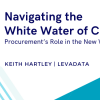In this episode of the Sourcing Industry Landscape, Dawn Tiura interviews Jeff Amsel. Jeff Amsel began his career in accounting, earned an MBA in marketing and then was recruited to work with procurement teams. With experience working as both a consultant and within corporate consulting companies, he has a unique understanding of the needs of clients, especially when it comes to alignment with C-Suite stakeholders.
Dawn Tiura: Hi everyone! This is Dawn Tiura from Sourcing Industry Group, also known as SIG. Now today, we're going to have a very interesting conversation with someone I've known for a number of years—we go way back. His name is Jeff Amsel, and Jeff is the Vice President of Global Sourcing and Real Estate, corporate facilities at HERE Technologies. So Jeff, I want to welcome you to today's program.
Jeff Amsel: Thank you Dawn. So excited to participate in this with you.
Dawn Tiura: This is great. So I have known you for a number of years and I know, now you're at a company called HERE Technologies. Let's start with just finding who HERE is, and it's H-E-R-E, because a lot of people don't know that brand and yet it's everywhere.
Jeff Amsel: Correct. Absolutely. About 30 years ago, our company actually started as NavTeq. Many people might be familiar with that name. We started by building maps for most of the cars on the road today about 30 years ago under the name of NavTeq. We were then acquired by Nokia and in 2015, we actually spun off to form HERE Technologies, and today we're owned by six investors. They consist of Daimler, Audi, BMW, Bosch, Intel and Continental AG.
Dawn Tiura: That's some big guys, yeah.
Jeff Amsel: Absolutely. Most of the German OEM's there. Originally we started with Daimler, Audi, BMW and just in the last year, those other three saw the value of some of the data that we sit on and they wanted to invest in us as well so we just took on three of those other investors in the last year.
Dawn Tiura: That's exciting. What is that-
Jeff Amsel: I'd say we have about-
Dawn Tiura: -you do at HERE Technologies, then? What is the company producing since they're not doing the navigation, or are they still doing the maps and navigation?
Jeff Amsel: Absolutely. So that's still core to our business. We're just about a billion in revenue and the map making business is still the majority of our business but our future is on location strategy, and what that means is that we're trying to use location data to support a lot of different initiatives that you hear about in the news today. Whether it's autonomous vehicles, or in the B2B space, we're trying to use location data with customers so that they can better track their fleet, supply chain needs, and even on the B2C side, we're also developing a platform to support mobility needs of customers. So, if you think about it—sort of a one place to shop for whether you need airlines; hotels; rental cars; you want to understand traffic patterns of what's happening. We're working out of our office in Israel to develop this mobility platform for B2C customers.
Dawn Tiura: Wow. So a lot of cool stuff going on there. And you joined—when did you join HERE?
Jeff Amsel: I joined about, almost a year and a half ago. Early January of 2017 and I'm based in our Chicago office where we have about 12 hundred people here. We're located in the Boeing Building. We have about nine thousand employees globally, and about 140 offices spread out in about 55 different countries.
Dawn Tiura: Wow. Wow. So, before we jump into what you, yourself, are doing at HERE, let's take a journey, because you've got such an interesting background. You have had forays into consulting, and then back into the buy side as in-house, and then back to consulting, and then on top of that you're a board member for the Chicagoland Chamber of Commerce. So why did you go—why do you go in and out of consulting occasionally during your career?
Jeff Amsel: It's been interesting, I would say, so to take folks on a quick journey over my experience over the last 25 years: I started off in accounting and joined a pharmaceutical company right out of school as their accountant, and was then working after that in their sales support area. And after getting my MBA in Marketing, in the evenings, I was actually approached by a recruiter to join Allstate Insurance, headquartered here in Chicago, to help build up their procurement team. So, I didn't know much about insurance other than having renter’s insurance and car insurance like most young 20-year olds, but I decided to take a risk and jump into it and that really launched my career in procurement.
Jeff Amsel: I then took on roles, building upon my experience over the four years at Allstate to then go on to work for another insurance company here in Chicago called CNA Insurance, and then eventually becoming the Chief Procurement Officer at Discover Credit Card when they were owned by Morgan Stanley, and that then led me to a role leading Procurement and Real Estate for North America for a large, global insurance company called QBE, headquartered out of Sydney, Australia, and as you've mentioned, for a few years in between, I did work at some of the leading consulting firms which was a great opportunity to experience the life of a consultant, right?
Jeff Amsel: And develop some new skills and relationships that a lot of these folks bring to the table, and so that was a great opportunity to get experience on both the corporate and consulting side.
Dawn Tiura: That's neat. So your last position, though, before you were at HERE, you were at Smart Cube and a very different type of company as well. So, it sounds, at least by looking at your journey, that the technology seems like it's a really strong attraction for you.
Jeff Amsel: Absolutely. I think a lot the roles that I've developed, first of all, I'd be remiss to say that over the last 15 years in the different roles that I've been in, a lot of that has been due to really networking and with the invention of media—social media tools—like LinkedIn that started roughly in 2002, I believe, these have really been critical to help me get introduced to some of these other companies that I've had the pleasure of working for over the years, and there's obviously a number of differences between consulting and corporate that I've learned and I can, maybe, just highlight a couple of those if that works?
Dawn Tiura: No, I'd love that because I think that's a really great nuance.
Jeff Amsel: Okay. So I'd say in the consulting world, it's interesting because all of us, I think, work with consultants at some point in our career, but not many of us actually get to actually be a consultant and work for a consulting company. Obviously there's a few of us that have, sort of, the hybrid experience but I've had the pleasure of doing both and what it's—I guess the consulting side has taught me is that, first of all, you obviously get trained, I'd say, in a different type of tools and skill set that you bring to help—for tools like PowerPoint, right? It really helps enable you to tell your story and convey a message to your stakeholders, right?
Jeff Amsel: Consulting helps you manage a very hectic schedule. You're in, typically, meetings all day and then, typically, with consulting companies your working until the late hour of the evening, so really managing your schedule during the day and into the evenings is very important.
Jeff Amsel: Culturally, I'd say, working for a consulting company is a lot different, from my experience, than working corporate—but again, it's good to experience both. As a consultant, it's critical that you understand, obviously, your stakeholder needs and also the vision of what Senior Management, because a lot of times as a consultant, you're bring brought in by the C-Suite teams so really getting aligned to what the C-Suite team is looking for is really important.
Jeff Amsel: I'd also say in consulting that politics exist just like they do in corporate. So understanding that the politics happen regardless of where you work these days is just part of the nature of the work that we do. I think one of the big differences, and you could probably experience this, too, from your prior days in consulting is that they like to use the phrase ‘Cash is King’, right? Producing revenue is so important for consulting companies and for consultants to really be focused on not only delivering, but also on developing further relationship to keep those, as we like to say at some of the places where I worked, we like to say that they're ‘clients for life’.
Dawn Tiura: Right, right.
Jeff Amsel: So, you’re exposed to a lot of different industries, a lot of different clients in my experience in consulting which is great. You're surrounded by, obviously, a lot of talented partners to learn from, and so it was a great experience.
Dawn Tiura: That's awesome, because I like the fact that you have to pick up these different skill sets because I think if you always stay on the consulting side, you get a reputation, sometimes, of someone who tries to push change without accepting the culture. But having been that you've been internal, you understand the politics side of it so when you consult, you're probably much more savvy about getting things to stick from a consulting engagement.
Jeff Amsel: Right. I think that balance is absolutely critical because I think we've all seen, right, where some people from consulting go into corporate and it doesn't always work, and vice-versa, and so what corporates taught me is that you have to operate and you have to understand very quickly the culture that you're operating in to be successful. I think it goes a long way in corporate to be a strong listener so that you can understand the needs of not only your team, but also your stakeholders so they truly feel that you're hearing their perspective.
Dawn Tiura: Yeah.
Jeff Amsel: I've learned, what I've learned in corporate, too, is as much as I can to, especially managing teams, is you want to constantly try to reward and recognize your team and
celebrate wins as often and frequently as possible. And just recently I was talking to my leadership teams about this that we're doing a little bit of this today, but we need to make it more formal and really elevate the program to really celebrate all the good work that we've been doing over the last year and a half because we're driving a lot of change.
Dawn Tiura: You know what, and I think so many people forget to celebrate at the end. They go onto the next project instead of stopping and saying, "Hey, we did a great job and let's celebrate this success before we move onto the next project."
Jeff Amsel: Absolutely. I think it really helps with the employee morale and, obviously, different folks get—want to be recognized and rewarded in different ways and understanding how to set up your program, is just as important as well.
Dawn Tiura: Yeah, I absolutely agree.
Jeff Amsel: I think other things I've sort of experienced on the corporate side—because that's where most of my career has been, obviously, in corporate—is you’re obviously working with a team of lot of diverse backgrounds and that inclusion and diversity effort is really important. In corporate, it continues to grow, from what I see at the different companies that I've been involved with, which is exciting. I also think that while we're working really hard, just like consulting, you have to have that balance of…I've always believed in sort of the work hard, play hard philosophy. You have to build a good team, a good chemistry, but also have fun while you're at work because we're all spending so many hours in the office these days and if you're not having a little bit of fun while we're doing it, I feel like we're missing something as a team.
Dawn Tiura: I love that. That's probably why I've always enjoyed talking to you for all these years. I think I met you back in the CNA days, and you've always had such a wonderful outlook and I like that.
Dawn Tiura: So you have had an amazing career and it's obviously not even half over but if you were to look back at your younger self and gave yourself a lesson that you wished you had learned or something that you wished you had known, what would you have done, possibly, differently, or wish you had known when you younger?
Jeff Amsel: I think, if I were to give my younger self some advice, I would say that take more time to learn about the organization and the different business segments because the more you can understand, holistically, about the company and how it operates the better off you'll be.
Jeff Amsel: Back when I started working, I don't know if the environment of working in teams was as prevalent as it is today and I think a lot of people recognize just the great outcomes that you can have by working in teams so I would say, also, try to be more collaborative and try and work more so in teams where it makes sense.
Jeff Amsel: I would also say, partner closely with the consultants. A lot of times, right, the consultants are brought in and, again, as I mentioned, they typically are brought in by the C-Suite so that they have, there's an idea out there that there's some opportunities to make improvements in the organization, so I think the more you can align with consultants and get on board to what they're trying to do, I think it'll benefit you. And the other thing I thought about, too, as I look back is, and again, this program, I think, has developed over the years where maybe when I first started working it wasn't as prevalent, is try to find yourself a mentor in the organization who's senior enough and well-respected, who you can learn from and grow and bounce ideas off of and-
Dawn Tiura: Now do you think your mentor has to be at your existing company or could it be a mentor from another company, or do you try and look for one at each new company?
Jeff Amsel: Yeah. It could be from another company but I've often found that if you're trying to, especially starting off early in your career, if you're trying to grow within a company, it's great to find those leaders and who you really look up to, the organization looks up to, they inspire, they motivate, so it doesn't have to be at the same company but I'm just thinking about early on in my career.
Dawn Tiura: Yeah, I guess it sure wouldn't hurt if you had a mentor in your organization that could help you avoid some booby traps and quicksand and things like that, as well.
Jeff Amsel: Absolutely, absolutely. I think the last point I'd mention is that of advice that I give myself is be more receptive to feedback and just be open; learn from it. Everything's a learning opportunity and perception is critical, right, because perception is reality, as they say, so I think I would tell my younger self just to think more about that, learn from it, and support it and grow from it.
Dawn Tiura: Well, you know, you have an interesting background though because coming out of college and going into accounting, and then getting an MBA in Marketing, usually those two—bean counters and marketing people—and I can say it because I'm a CPA, recovering CPA, those two don't usually go together so I find that so interesting that you, you're not a typical bean counter at all. You've got a fabulous personality and you're saying the right things about people and process and rewarding and celebrating and that. So, what made that jump? How did you go from Accounting to Marketing to Procurement? I just find that such an interesting balancing.
Jeff Amsel: Yeah, it was actually when I was at the pharmaceutical company, I realized after several years in accounting that I didn't want to do accounting the rest of my life and I wanted an opportunity to do something different and with my personality, I had formed some good relationships with our sales support team and they supported the U.S. sales force so an opportunity opened up to join that group and I made that jump and back in the day, that was a very significant change, right, to take somebody out of accounting to the sales organization. But again, if you have the right personality and the skill set, which we all look for as we're recruiting people to our teams, we want those people that are really well-rounded that can not only be—call it here at HERE Technologies, we call it the ‘what’ and the ‘how’, right? We don't want people that are just really good at what they're doing but we want people that know how to do it as well, how to engage with the stakeholders and interact and have a good dialogue and build relationships and trust and that, that, I think, skill set is important. And I think I had it early on in my career which is why I was able to jump to the sale organization and do that type of work.
Dawn Tiura: Yeah. That's really neat. Are you available if people would like to reach out to you after this podcast airs and have conversation about their careers? Are you open to mentoring, perhaps, a person or just providing some sound advice?
Jeff Amsel: Absolutely. I've done it in the past and I actually am part of a coaching program here within our company as well and happy to have those conversations.
Dawn Tiura: I thought you would be, so thank you. So folks, I'm going to make sure that you have the contact information for Jeff. Make sure you LinkIn with him and get in and be part of his network.
Dawn Tiura: And that's the power of SIG is that we want to keep people networking and growing and just keep elevating the industry. And Jeff, I can't thank you enough for everything you've done to help us elevate the industry by being forward thinking, by recognizing that you can't just have hard skills, you need to have the soft skills, and demonstrating that through your career. You've just been somebody that's been so fun to watch and to learn from and I think everyone could benefit from knowing you.
Jeff Amsel: I appreciate it, Dawn, and obviously it's been great being a part of SIG over the last 10 or 12 years that I've been part of the organization, and I enjoy all the networking and the default leadership that's produced out of it and, like I mentioned early on, that networking is so important in our industry, right, because we're a tight-knit community ,and everyone knows everyone, and it's just a great resource that SIG provides to on-fault leadership and the ability to promote different topics in the procurement space, so thank you so much for thinking of me for this discussion.
Dawn Tiura: Yeah. So I just have to let you know, Jeff, that I ask our team to send in nominations and when it triangulates, so for that, that means three different people have nominated the same person, I go, "All right, that's somebody that I have to have on this program," and so that's how you got here. Not just me wanting you—but you came in with three nominations to be on the podcast, so you've got to feel good about yourself. Because to be on Art of Procurement with Dawn Tiura I have to have people raving about you, and so that's why you're here today, so thank you for your time. I know we're going wrap this up. Jeff Amsel, with HERE Technologies. Vice President of Global Sourcing and Real Estate, Corporate Facilities with an amazing background, and I encourage everybody to add him to your network if you don’t already know him. If you do, then just reach out and say congratulations. And with that, I'm going to wrap up today's call. So, thank you Jeff, thank you for your time today.
Jeff Amsel: Thank you so much, Dawn.
Dawn Tiura: Bye-bye.





